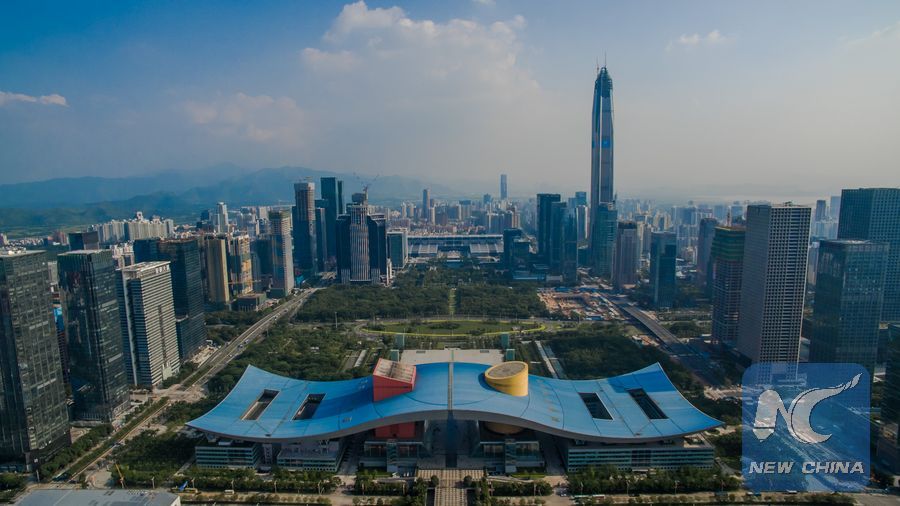
An aerial photo taken on Aug. 23, 2015 shows the Futian District in Shenzhen, south China's Guangdong Province. (Xinhua/Mao Siqian)
HOUSTON, July 18 (Xinhua) -- China has been making tremendous efforts to transform its top megacities into smart ones through innovation, government support and international cooperation, said current and former officials of Chinese and American cities at a summit on Wednesday.
Air and water pollution, healthcare burdens, and demographic issues are among the primary challenges facing these heavily populated cities, said Annise Parker, former mayor of Houston, the fourth largest city in the United States.
She made the remarks during a panel discussion at the fourth U.S.-China Sister Cities Mayors' Summit, noting that urbanization propelling the growth of megacities will continue.
Smart city building backed by high-tech innovation and global collaboration will alleviate the problems brought by continuous expansion, according to the panelists.
The number of megacities, a notion refers to cities with an urban population of 10 million or more, drastically increased to 33 by 2018, topped by Tokyo, Delhi and Shanghai. China alone has at least six, UN statistics show.
Shenzhen, a megacity mushrooming from southern China, has also been gripped by some urban malaise, said Zhong Jiajun, deputy director general of foreign affairs office of Shenzhen municipality.
To tackle such challenges, authorities in Shenzhen formulated a three-year action plan last year, encouraging academics and businesses to participate in the top-level design of smart city projects to create a harmonious, energetic and sustainable urban environments and bolster living standards.
The plan falls under the Outline Development Plan for the Guangdong-Hong Kong-Macao Greater Bay Area, an initiative the Chinese central government put forth in February that maps out a smart future for the city cluster.
Shenzhen-based telecom giant Huawei, for example, has provided easier access to public services by improving its e-government cloud services. Tech firm Tencent as well as PingAn, a top financial services provider, are also working closely with the Shenzhen government to boost services.
Public servants in Shenzhen can now use tailored interfaces in mobile applications like Wechat to meet residents' pressing needs. Such smart options have spared people running errands and queuing for services, according to Zhong.
Shenzhen will also continue its development in the 5G industry, which encompasses wireless sensor networks, big-data analysis and artificial intelligence, and pave the way for emerging industries such as internet of things and cloud computing, he said.
Similarly, the capital city of southwestern Sichuan Province created a four-year action plan to accelerate the development of the mobile internet, cloud computing, internet of things, and big data, said Li Li, vice president of Chengdu People's Association for Friendship with Foreign Countries.
The plan will help create an "Internet Plus Public Service System," with 90 percent of public services going on-line, including social security. The city also plans to set up a "City Smart Governing Center" for better prevention of public emergencies and more prompt responses.
The inland city shares a global perspective and treasures tech-based innovation along with its development, said Li, noting that Chengdu has hosted large venture fairs in recent years.
Chengdu so far boasts more than 3,000 high-tech companies, and 200 sci-tech business incubators and maker-spaces. Its high tech industry output reached over 1 trillion yuan (150 billion U.S. dollars), according to Li.
Chengdu so far has knotted sister-city or friend-city ties with 100 counterparts around the globe, seven of which are in the United States, including Austin, capital of the Texas state, which joined the rank in early July.
"Innovation and smart cities building cannot be realized without international cooperation," said Li.

